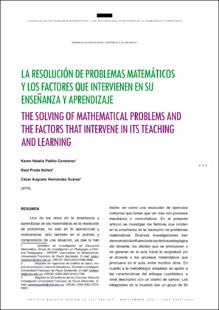La resolución de problemas matemáticos y los factores que intervienen en su enseñanza y aprendizaje
The solving of mathematical problems and the factors that intervene in its teaching and learning
Artículo de revista
2021-09-01
Boletín Redipe
Colombia
Uno de los retos en la enseñanza y aprendizaje de las matemáticas es la resolución de problemas, no solo en lo operacional y motivacional, sino también en el análisis y comprensión de una situación, ya que la hecho ver como una resolución de ejercicios rutinarios que tienen que ver más con procesos mecánicos o memorísticos. En el presente artículo se investigan los factores que inciden en la enseñanza de la resolución de problemas matemáticos. Diversas investigaciones han demostrado la influencia de la práctica pedagógica del docente, los afectos que se promueven y se generan en el aula hacia la asignatura y/o el docente o los procesos matemáticos que promueve en el aula, entre muchos otros. En cuanto a la metodología adoptada se ajusta a las características del enfoque cuantitativo, a nivel descriptivo con un diseño de campo. Los integrantes de la muestra son un grupo de 80 docentes que laboran en instituciones públicas o privadas de Cúcuta y su área metropolitana. Se aplicó un cuestionario que ha sido validado y se compone de 54 ítems en total en dónde se evalúan seis procesos matemáticos, de los cuales 9 ítems corresponden al proceso de resolución de problemas, todos son evaluados mediante una escala Likert de cinco niveles. Los resultados indican que la resolución de problemas se correlaciona significativamente con los demás procesos matemáticos y se concluye que los procesos matemáticos no pueden funcionar de manera independiente o aislada unos de otros. Un aspecto importante a resaltar para futuras investigaciones es identificar ¿qué entiende el docente por un problema? Si ¿realmente le plantea situaciones problema a sus estudiantes o si son simplemente ejercicios en situaciones contextualizadas para los cuales ya tiene definido un algoritmo de solución? Estas inquietudes surgen como posibles complementos investigativos a estos resultados, puesto que todos los procesos matemáticos deben estar asociados con la resolución de problemas y parece que algunos de ellos no son potenciados en el trabajo de aula. One of the challenges in the teaching and
learning of mathematics is problem solving, not
only in the operational and motivational aspects,
but also in the analysis and understanding
of a situation, since it has been seen as a
resolution of routine exercises that have more
to do with mechanical or rote processes. This
article investigates the factors that influence
the teaching of mathematical problem solving.
Several investigations have shown the influence
of the teacher’s pedagogical practice, the
affections that are promoted and generated in
the classroom towards the subject and/or the
teacher or the mathematical processes promoted
in the classroom, among many others. As for
the methodology adopted, it is adjusted to the
characteristics of the quantitative approach, at a
descriptive level with a field design. The members
of the sample are a group of 80 teachers working
in public or private institutions in Cúcuta and its
metropolitan area. A validated questionnaire was
applied, which consists of 54 items in total, where
six mathematical processes are evaluated, of
which 9 items correspond to the problem-solving
process, all of them are evaluated by means
of a five-level Likert scale. The results indicate
that problem solving correlates significantly
with the other mathematical processes and it is
concluded that mathematical processes cannot
function independently or in isolation from each
other. An important aspect to highlight for future
research is to identify what does the teacher
understand by a problem? Do they really pose
problem situations to their students or are they
simply exercises in contextualized situations
for which they have already defined a solution
algorithm? These concerns arise as possible
research complements to these results, since all
mathematical processes should be associated
with problem solving and it seems that some of
them are not enhanced in classroom work.
Descripción:
La resolución de problemas matemáticos y los factores que intervienen en su enseñanza y aprendizaje.pdf
Título: La resolución de problemas matemáticos y los factores que intervienen en su enseñanza y aprendizaje.pdf
Tamaño: 396.4Kb
 PDF
PDF
 LEER EN FLIP
LEER EN FLIP
Título: La resolución de problemas matemáticos y los factores que intervienen en su enseñanza y aprendizaje.pdf
Tamaño: 396.4Kb
 PDF
PDF
 LEER EN FLIP
LEER EN FLIP
















